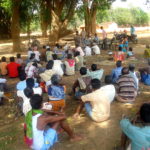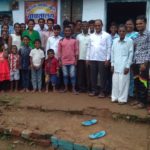‘Fishing’ for Entrepreneurial Dreams
Tagori Mondol hails from a small village in Barrackpore, West Bengal and is a member of ‘Perona’ SHG. She lives with her husband, Sumit Mondol and a 10 year old son. As a family, for a very long time, they were burdened with a prolonged financial crisis. Her husband is a daily wage worker so there was always an inconsistency in getting hired daily to earn a day’s income. With whatever meager income Sumit earned, they were not able to afford proper food and clothing. The question of her son going to school regularly seemed farfetched. With no land of their own, they were also unable to opt for agriculture to earn livelihood through it.
In this time of need, her relatives and neighbors also brushed her away and did not come forward to help her in any manner. If she wanted to borrow anything from them, they seemed aloof and disinterested. This made her even more distressed and she could not figure out what to do.
But light soon entered through the cracks when she was able to talk to Nayami Pramanik, one of the Community Enablers working with DBSS Barrackpore in her village. Nayami became a huge support to encourage and guide Tagori to come up with a sustainable livelihood option. Nayami advised her to take a small loan from their SHG group account and start her small fishing business.
She soon decided to take the risk and took a loan of Rs.20, 000/- and began to work. Tagori hired a pond of 10 katha on rent from Tapash Mondal of Chakbishu village at Rs.7000 and with the balance money; she bought fish nets and fish food.
After few months of fish farming and patient wait, soon the story changed and now after every 6 months, she collects the fish from the pond and sells it in Nepalgunge and Pailan haat, the nearby local market places. With the profit earned, she repaid back the loan taken to her SHG group account and later bought a cycle and a television for her family.
Eventually, with 2 years of consistent business and support from SHG members and DBSS, she had an income of Rs. 60,000/- and her net profit was Rs. 40,000/-. From nothing to something, it will always be a memorable journey for her.
Commenting on her progress over the years she says- “Witnessing a steady income for over two years, I am now more confident and have decided to hire more ponds surrounding my village and continue to grow my business and provide good future to my children.”
Stories like Tagori have become quite common in many rural villages of West Bengal where apart from men, women are also coming forward to take charge and earn a living for their families. Livelihood options like fishing not only provides a regular income but also gives the community women the opportunity to think along the lines of becoming entrepreneurs in future.
Fishing in Bengal is not only a source of income but also a provider of necessary nutrients for the human body. Moreover, fishing influences local and national economy, creates scopes of engagement for the rural women and marginal farmers, alleviates poverty through employment generation, helps the development of ancillary industries and infrastructure, conserves the aquatic ecosystem and biodiversity etc. Overall it helps in the total development of a region.



